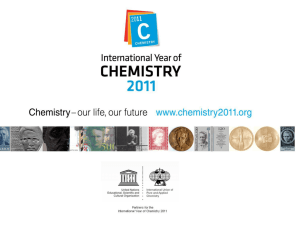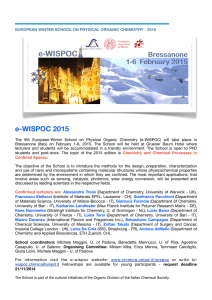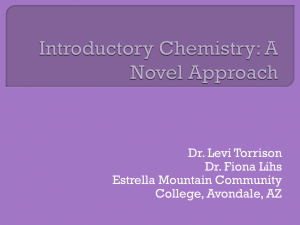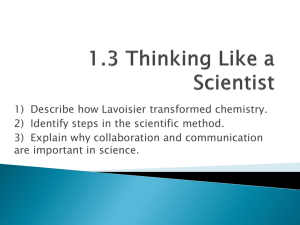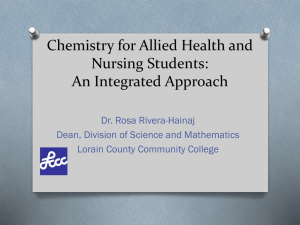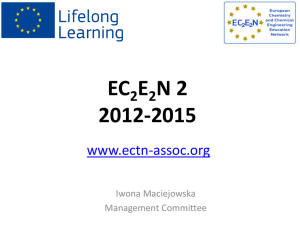Document
advertisement
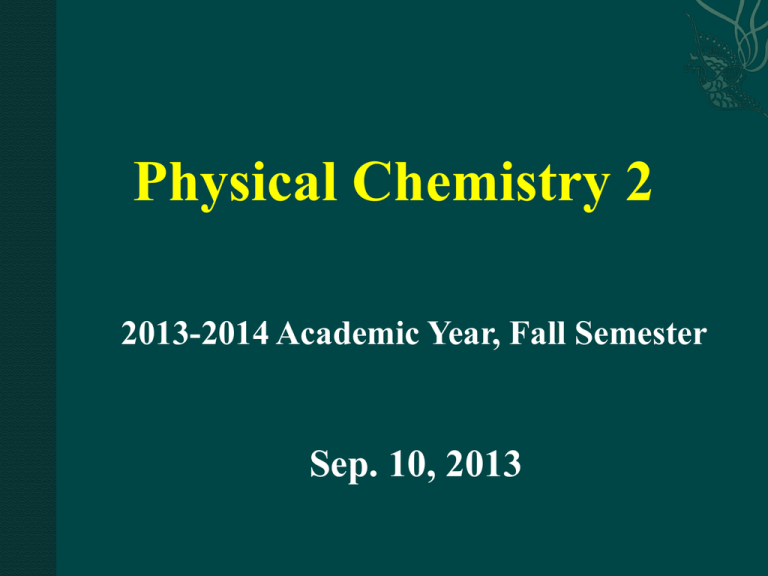
Physical Chemistry 2 2013-2014 Academic Year, Fall Semester Sep. 10, 2013 1. Course information 1.1 Course website 1.2 About the tutor Prof. Shu-Yong ZHANG 张树永 Ph. D. in Physical Chemistry; Professor in chemistry; Supervisor for Ph. D. in Electrochemistry; Main research interests: (1) Electrochemical fabrication and synthesis; (2) Corrosion and protection of metallic materials; (3) Lithium-ion battery and direct liquid fuel cell. 1.3 Teaching Assistant Miss Pang Xin-Jing (庞新晶) Candidate for MS Contacting information: Phone: 88365456 E-mail: jingjing19900213@126.com 1.3 Timetable and place Time Tuesday 10:10 – 12:00, (all weeks) Thursday 10:10– 12:00 (odd weeks) Place Science Complex 502d 1.4 Office hours Thursday: 20:00 – 22:00 Room 243 MingDe Building – B Block Phone: 61378 E-mail: syzhang@sdu.edu.cn 1.6 Grading policy: 10-minute and question answer: 10%; Homework: 10%; Quarter Exams: 15% Course presentation: 10% Course thesis: 10%; 优 One-page synthesis: 5% Final exam: 50%. Totally, 100 pts. 1.6 Grading policy: 1.6 Grading policy: Group discussion Students’ presentation 1.6 Grading policy: Example for quarter exam 1.7 Suggested references: 1 ) Xian-Cai Fu, Tian-Yang Yao, Wen-Xia Shen, “Physical Chemistry (5th Ed.)”, Higher Education Press, Beijing, 2006. 2) Peter Atkins, and Julio de Paula, “Atkin’s Physical Chemistry (7th Ed.)”, Oxford University Press, 2002. 3) Raymond Chang, “Physical Chemistry for the Chemical and Biological science”, University Science Books, California, USA, 2000. 2 What will we learn in Physical Chemistry (2)? Course rational soybean nodule nitrogenase Can we synthesize ammonia directly from water and dinitrogen under ambient temperature and pressure just like nitrogenfixing bacteria does ? 2N2 + 6H2O = 4NH3 + 3O2 Electrochemistry Possibility vs. reality Spontaneous process diamond graphite Chemical kinetics People in Zunyi city cross Xiangjiang river on a piece of bamboo. Damo crossed Changjiang river on a reed. water strider 水黾 Surface chemistry What is nanomaterials? Why the properties of nano-scale materials are quite different from those of bulk materials? Polymer nanotube Nanopore array (anodic aluminum oxide, AAO) Nanowire and nanorod Colloid Chemistry Main contents Electrolyte solution Electrochemistry Surface chemistry Colloid chemistry Classic kinetics Reaction mechanism 3. How to improve your learning? “…and, as you go out into the world, I predict that you will, gradually and imperceptibly, forget all you ever learned at this university”… What have we learnt and what will we forgotten, knowledge, ability or makings? Major Categories in the Taxonomy of Educational Objectives Level Student goals Knowledge Recall facts, concepts, or principles. Know dates, events, major ideas. Comprehension Translate or interpret information. Describe meanings and relationships in own words. Application Apply a skill or concept to a new situation. Solve new problems. Illustrate and use knowledge. Analysis Break information down into parts. Identify parts, their inter relationships, and their organizational principles Synthesis Compose the parts into a new whole. Organize information in a new way. Get broad ideas from specific ideas Evaluation Judge the value and/or accuracy of purposes, ideas, and methods based on a standard. Find support for arguments. http://www.coun.uvic.ca/learn/program/hndouts/bloom.html Discussion and group work are very important for you to improve your learning. 4. Our teaching strategies (1)Teaching philosophy 第一个层次:教知识 ---- 教师 (1)授人以鱼 第二个层次:教方法 ---- 名师 (2)授人以渔 第三个层次:教境界 ---- 大师 (3)授人境界 使学生先悟教师之道 再悟自己之道(做人、学问) 韩愈《师说》:师者,所为传道、授业、解惑也。 传道?《老子》开篇的第一句:“道可道,非常道”。 “道”的达成需要个人领悟,不是教出来的。 背书、找答案永远成不了“道”。 授业?不是教书,而是教如何“成业” 。 解惑?不是扼杀问题和质疑。而是引导学生质疑教材、 质疑权威,启发思考。 让学生带着自己的观点看书,立自己的一家之言, 而非简单的接受和盲从。 (1)Teaching philosophy 1)激发学生乐道悟道比传道更重要 2)激发学生学会学习比授业更重要 3)激发学生独立思考比解惑更重要 张德江, “现代教学观下的教师职责”,中国大学教学, 2010, 3: 4-6 The results of puzzling (2)Methodology introduction 任何基础理论课程的教学内容均由普遍性原理和科学 方法组成。在准确讲解基本原理的同时,必须提炼出主要 方法加以讲解。 高盘良,科学方法教育与创新能力培养,中国大学教学,2010(3):7-8 (3)What should we do outside class? 预习:预习问题、基本概念与基本原理 复习:读2-3本书。读外文教材。1-2小时。 作业:习题、课外阅读、讨论、准备报告 小组作业:小组问题、小组报告 课程论文:发现问题、查阅资料、进行试验、撰写论文。 培养学生利用图书资源进行综合学习的能力、提出 问题和解决问题的能力、团队合作的能力。 5. Useful websites for your learning Useful website for learning chemistry Useful website for learning chemistry http://www.tannerm.com/ Useful website for learning chemistry http://www.chem.uiuc.edu/webFunChem/GenChemTutorials.htm Useful website for learning chemistry http://ull.chemistry.uakron.edu/genchem/ Useful website for learning chemistry http://videolectures.net/mit5111f05_drennan_lec19/ Useful website for learning chemistry http://ocw.mit.edu/courses/chemistry/

